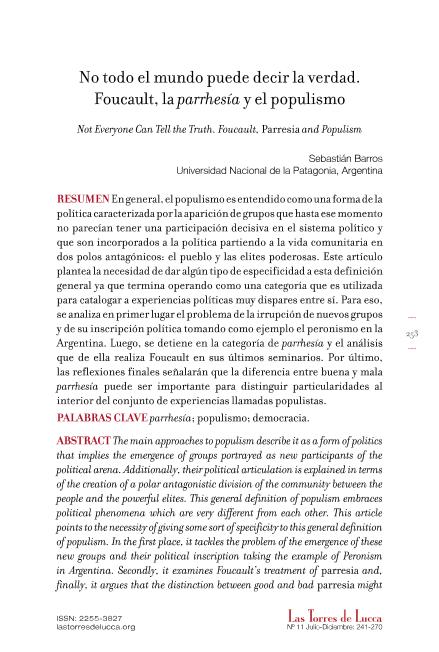Artículo
En general, el populismo es entendido como una forma de la política caracterizada por la aparición de grupos que hasta ese momento no parecían tener una participación decisiva en el sistema político y que son incorporados a la política partiendo a la vida comunitaria en dos polos antagónicos: el pueblo y las elites poderosas. Este artículo plantea la necesidad de dar algún tipo de especificidad a esta definición general ya que termina operando como una categoría que es utilizada para catalogar a experiencias políticas muy dispares entre sí. Para eso, se analiza en primer lugar el problema de la irrupción de nuevos grupos y de su inscripción política tomando como ejemplo el peronismo en la Argentina. Luego, se detiene en la categoría de parrhesía y el análisis que de ella realiza Foucault en sus últimos seminarios. Por último, las reflexiones finales señalarán que la diferencia entre buena y mala parrhesía puede ser importante para distinguir particularidades al interior del conjunto de experiencias llamadas populistas. The main approaches to populism describe it as a form of politics that implies the emergence of groups portrayed as new participants of the political arena. Additionally, their political articulation is explained in terms of the creation of a polar antagonistic division of the community between the people and the powerful elites. This general definition of populism embraces political phenomena which are very different from each other. This article points to the necessity of giving some sort of specificity to this general definition of populism. In the first place, it tackles the problem of the emergence of these new groups and their political inscription taking the example of Peronism in Argentina. Secondly, it examines Foucault’s treatment of parresia and, finally, it argues that the distinction between good and bad parresia might be important in order to make distinctions within the field of the so called populist political articulations.
No todo el mundo puede decir la verdad. Foucault, la parrhesía y el populismo
Título:
Not everyone can tell the truth. Foucault, parresia and populism
Fecha de publicación:
12/2017
Editorial:
Universidad Complutense de Madrid
Revista:
Las Torres de Lucca
ISSN:
2255-3827
Idioma:
Español
Tipo de recurso:
Artículo publicado
Resumen
Palabras clave:
Populismo
,
Foucault
,
Parresia
,
Popular
Archivos asociados
Licencia
Identificadores
Colecciones
Articulos(SEDE CENTRAL)
Articulos de SEDE CENTRAL
Articulos de SEDE CENTRAL
Citación
Barros, Manuel Sebastian; No todo el mundo puede decir la verdad. Foucault, la parrhesía y el populismo; Universidad Complutense de Madrid; Las Torres de Lucca; 6; 11; 12-2017; 251-282
Compartir




